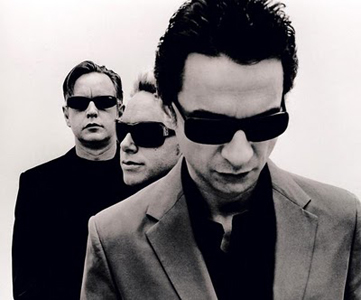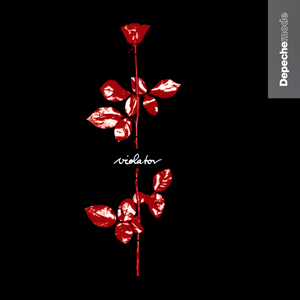Depeche Mode's Marriage of the Digital and Analog World in My Eyes
January 3, 2014 by Mike Czech
I started playing electric guitar after hearing the Kiss album Love Gun when I was eleven years old. There was something magical and mysterious about holding a piece of wood in my hands and strumming the metal strings over magnetic pickups to get a loud noise to come out of the amplifier I was using. This experience of playing chords and picking out lead guitar solos on my electric guitar felt organic and some kind of extension of myself. I would listen to other guitarists and feel their vibes and extensions of their souls transmitted through the many albums I would listen to as their techniques influenced my own style of playing. I taught myself to play guitar through listening to hard rock, punk, and heavy metal bands after learning barre chords and blues scales and by high school, I was good enough to play in bands with other passionate people wanting to rock out. In college, I was able to hold my own as a solo act in coffee shops playing acoustic versions of my favorite songs. After college, I would play guitar in my high school English classrooms and parallel the literature we were reading to classic rock songs from Pink Floyd, Velvet Underground, Rush, David Bowie and other musicians who had a literary bent in their lyrics. And throughout it all, I considered myself a rock purist addicted to that loud distorted guitar noise that I first heard when Paul Stanley strummed his Ibanez Ice Man back in 1978.
My favorite bands growing up were bands that were usually four or five pieces, which included electric guitarists, bassists, drummers, and lead vocalists. I was not into keyboards but made exceptions to bands like the Doors, the Cure, Led Zeppelin, the Cars, Split Enz, XTC, Psychedelic Furs, and other bands who used them as long as there was a live drummer, bassist, and guitarist holding it all down. The one thing I abhorred was a drum machine. If a band used drum machines, I thought they were not playing real music since they were cheating and using some computerized electronic preset or programmed rhythm in their music. Furthermore, I was not into bands that relied heavily on synthesizers and samples for their sound since this seemed to be cheating, too. Pushing down one key on a synthesizer and getting one affected sound or sample that would pretty much make up the whole song was not showing me that this band knew how to play music. Thus, I was not into hip-hop or electronic synth music. I considered bands in these genres as non-creative since they had machines doing the hard work for them. Digital was anathema to me, as I only wanted the warm analog feel of reel-to-reel tape and alnico pickups wrapped around my brain when getting into my passion for music. This all changed when I heard Depeche Mode’s Violator album in 1991.


I had heard of Depeche Mode during my high school days since I loved watching MTV and remembered seeing their videos for “People are People” and “Everything Counts” (the live 101 version with Dave Gahan dressed all in white and leading the thousands of fans at the Pasadena Rose Bowl in an a cappella chant of the refrain). I would usually change the channel when their videos came on since I didn’t see anything good about the band’s use of digital synthesizers and drum machines. I would listen to Depeche Mode at the dance clubs I frequented as an undergraduate in college since they were ubiquitous in 1989-1990 with the release of their singles and videos for “Enjoy the Silence,” “Policy of Truth,” and “Personal Jesus.” I would hear these songs everywhere but would never really listen to them since I had a wall erected that stereotyped them and any other synth band as talentless computer hackers churning out processed noises for the masses. Where was the guitar? Where were the live pounding drums? All I heard were blips, crackles, and drones underneath a vocalist trying his hardest to sound like David Bowie circa 1977.
After leaving college in 1990, I got my first high school teaching job and noticed that many of my students liked Depeche Mode. Interestingly, the students who liked them were either female, gay, or non-popular kids who were more into fashion and wearing cool black clothes, creative makeup, and interesting hairstyles. Most of the male heterosexual students liked hard rock or guitar driven music and disliked synth music because they felt it was not “real” music. To like Depeche Mode, one had to be effeminate and into hearing songs about S & M, strange loves, obsessions, and being safe as houses. I listened to my students talk about how great the band was and how Martin Gore was a creative genius and how Dave Gahan was a great singer. No one knew too much about Andy Fletcher since he did not play an instrument and did not do much in the band other than help manage it. And some gave props to Alan Wilder, the other great musician in the band, since he programmed the synthesizers and added lush arrangements to Gore’s songs. But, overall, I still thought that Depeche Mode wasn’t that talented because they were a synth band using drum machines and digital equipment to get their message across.
During the summer of 1991, I took a job in between my teaching duties that had me traveling 30 minutes to and from my place of employment. I would make these great guitar-driven classic rock mix tapes for the drive and plop them in the cassette deck of my 1978 Malibu Classic. Sometimes after work, I would go and visit my best friend Drew and his girlfriend Jen, who was a Depeche Mode fanatic. She had all of their cassette tapes and had posters of the band on her walls. I remember seeing Martin Gore on one of her posters and thought he looked a little weird with his curly blonde hair contrasted against the black leather bondage gear he was wearing. But, on a whim, I asked her to make me a mix tape of her favorite Depeche Mode songs since I wanted to know why so many people I knew liked this band. I wanted to know if I was missing out on something and I thought it would be good to have another mix tape to listen to on my drive to work. Jen made me a mix tape and I took it and put it in the box of my other mix tapes in the back seat of my car.
About a week passed before I dug out Jen’s mix tape on my way to work and put it in my cassette deck and pressed play. I didn’t know it at the time, but Jen recorded Depeche Mode’s entire Violator album on side 1 of the tape and then put a mix of their other songs on side 2. So, I started driving and the first song on the album, “World in My Eyes,” came on. The first thing I heard was the synth bass line, which I thought was interesting because it had a memorable riff that I thought could be played on guitar. I didn’t like the drum machine that came in next, but I tried to keep an opened mind since I wanted to know what was so special about this band. I heard Dave Gahan’s vocals and was able to tolerate his voice since I am a sucker for Bowie-like baritone crooning as he sang, “Let me take you on a trip around the world and back and you won't have to move, you just sit still.” What was this trip and why wouldn’t I have to move to get there? Well, as the album progressed, I understood the answer to these questions. After “World in My Eyes” ended, “Sweetest Perfection” started with a snare drum shuffle that sounded analog to my ears and opened my mind to this song. This time Gore was singing the song and I thought he had a great voice that was even more emotional than Gahan. What sold me on this song was the classical violin/orchestral break playing a succulent chord progression that gave me a chill. I was starting to get hooked as the next song, “Personal Jesus,” and its great twangy guitar riff was being played over some snappy drums. I was drawn in by the analog guitar and by the end of the song I was singing the catchy chorus, “Your own personal Jesus, someone to hear your prayers, someone who's there.” Yes, I was on a trip just sitting there with Depeche Mode as my personal Jesus giving me the sweetest perfection in music as I started to understand that though they were using many digital instruments to make their sound, they were also using some analog guitar, bass, and drums to accompany everything in a nice warm soup of great chord progressions and memorable hooks.

And then it happened. Just like hearing the Kiss song “Love Gun” for the first time and getting that electric shock throughout my body, the next song on the tape started playing and I knew that I was going to be addicted to Depeche Mode just like every person I met who liked the band. “Halo” came on with a sparse arrangement of just a bass line and Gahan singing,” You wear guilt like shackles on your feet, like a halo in reverse.” I thought this was a great line since I never thought of wearing a halo in reverse as a sign of being guilty and as I was pondering this thought, the song kicked in with this shimmering and majestic arrangement of chords, synthesizers, and drums and I felt the electric shock go through my body again. I smiled and started to nod my head to the beat as Gahan sang, “There's a pain, a famine in your heart, an aching to be free.” I wasn’t sitting still anymore on my trip, I was into this song and as each movement passed, I got deeper and deeper into feeling the music and instrumentation and when it ended, I automatically rewound the tape and played it again. I played “Halo” four more times and even sat in the parking lot listening to it before I had to go into work. The famine in my heart was freed by this song and after work was over, I looked forward to listening to more of Depeche Mode on my trip home.
The rest of the album was good, as there were some great chord progressions on “Waiting for the Night” and “Enjoy the Silence” and there were some great bass lines on “Clean” and “Blue Dress,” but it seemed anticlimactic since it was not as memorable as the “Halo” experience I had on my trip to work. What was memorable was the second side of the mixtape that Jen had made me. She had recorded some alternate mixes of some of the songs from Violator that I had just heard. There was an acoustic version of “Personal Jesus” and there was a remix of “Enjoy the Silence” with just a harmonium playing the chords as Gahan sang over both of these songs’ skeletal arrangements. It was then and there that I realized that it did not matter what instruments were being used to create the song, it was the song itself that would be able to stand up and be counted as a worthy piece of art. To hear “Personal Jesus” and “Enjoy the Silence” stripped down to only one instrument and a vocalist was a revelation because I was able to focus on the chord progression of the song and the vocal melody being sung over top of it. And these songs were able to stand on their own since they were catchy and memorable and came across as even more passionate than the album versions of added synthesizers and drum machines. Even Johnny Cash recorded an acoustic version of “Personal Jesus” before he died since he felt the song’s chordal arrangements and lyrics were very strong. After listening to the mixtape many times and getting into Violator as well as other tracks such as “Never Let Me Down,” “Black Celebration,” “Fly on the Windscreen,” and “Strangelove,” I started to incorporate Depeche Mode songs into my acoustic shows whenever I played out at coffee houses or events.
Depeche Mode’s Violator opened my eyes to understanding that digital could coexist with analog in my mind because it was the song as a whole that was more important than what equipment was used to play or record it. I found a new respect for digital equipment, too, since I heard it being played on this album in a way that was like an analog guitar or bass riffing on the hook and melody lines. Furthermore, though Violator has a completely black cover, there is a picture of a red rose in the middle of it. To me, this symbolizes the marriage of digital and analog since the black cold sterility of digital can be warmed up by the red rose of analog depending on how you use them together. For many critics and fans alike, Violator was the peak of Depeche Mode’s creative force and is always referenced whenever the band puts out a new album and wants to get back to that “Violator sound” since Gore is an avid collector of old school digital equipment from the 1960’s and 1970’s, which he used on that and subsequent albums. About four years ago, I sold a Ross Analog Delay pedal from 1979 to Gore on eBay. He was the highest bidder and I emailed him to tell him that I would be sending the pedal but I also told him that I appreciated his songs and that I was a fan who saw him play live three times over the years. He thanked me for my comments and told me that he would leave me positive feedback when he got the pedal. He left me positive feedback and I left with a positive feeling since I thought somewhere on some song, Gore might use that Ross Analog Delay pedal to add a warmness to the digital that would garnish another one of his masterful songs.
Copyright 2014 by Somebody's Webpage







